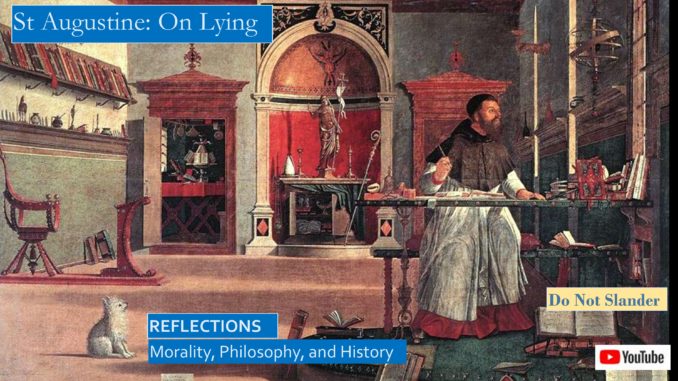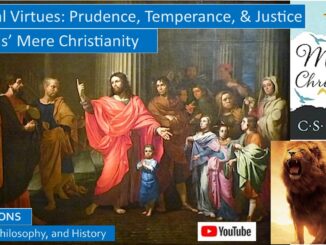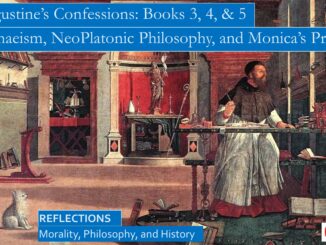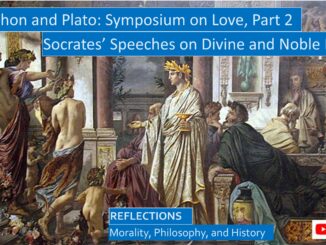
St Augustine opens his book On Lying, “There is a great question about LYING,” which confronts us every day, troubling us every day, whether “we rashly call a lie that which is not,” or decide whether a white lie can “be a kind of honest, well-meant charitable lie.”
To answer this question we face daily, we must search our motives, whether our words are spoken “to any good purpose.”
Can we be sure our motives are pure? “This discussion is full of dark corners and cavern-like windings, which eludes the eagerness of the seeker,” for even charitable lying, if there is such a thing, is a spiritually dangerous thing.(1)
The best eBook of Nicene and Post-Nicene Fathers, Series 1, Volume 3, can be purchased at https://www.christianbook.com/
YouTube video for this blog: https://youtu.be/PuY5KAyeDXc
YouTube script with book links: https://www.slideshare.net/BruceStrom1/st-augustine-on-lying
When we ponder the question we should ponder with St Augustine the actions of the Hebrew midwives in Egypt in Exodus:
The king of Egypt said to the Hebrew midwives, one of whom was named Shiphrah and the other Puah, “When you act as midwives to the Hebrew women, and see them on the birth stool, if it is a boy, kill him; but if it is a girl, she shall live.” But the midwives feared God; they did not do as the king of Egypt commanded them, but they let the boys live. So the king of Egypt summoned the midwives and said to them, “Why have you done this, and allowed the boys to live?” The midwives said to Pharaoh, “Because the Hebrew women are not like the Egyptian women; for they are vigorous and give birth before the midwife comes to them.” So God dealt well with the midwives; and the people multiplied and became very strong. And because the midwives feared God, he gave them families.[1]
Did the Hebrew midwives sin when they told this lie to Pharaoh? Did the Hebrew midwives lie?
Many thousands of Jews were saved from the Holocaust by lies of this sort, many people helped hide Jews and paid with their lives, several diplomats issued thousands of passports permitting Jews to emigrate to avoid the death camps, and we all know the story of Oscar Schindler who lied constantly to the Nazis to save his Jewish workers.[2]
What is odd about St Augustine mentioning the benevolent lies of the Hebrew midwives is he also mentions two other instances where the patriarchs lied that may not be as clear cut, as St Augustine tells us, “in the case of Sarah, who, when she had laughed (at her bearing a child at such an advanced age), denied to the angels that she had laughed, and of Jacob being questioned by his father, and answering that he was the elder son Esau” (robbing him of his birth right). St Augustine says that these “lies told by persons whom you would not dare to blame, and so we must conclude that it may sometimes be not only blameworthy, but even praiseworthy to tell a lie.”(5)
St Augustine then provides the common situation when we may choose not to tell the truth to a gravely sick man, for fear that his health would worsen if we told him some uncomfortable and emotionally damaging truth, if such a psychic blow could prevent him from recovering his health.
St Augustine in his Retractions says he wrote this book to “inculcate the love of speaking the truth.”
The Catholic Catechism (CCC 2482) quotes On Lying to say that a “lie consists of speaking a falsehood with the intention of deceiving,” which in our translation is rendered, “a lie is any utterance whatever with will to deceive.”(4) But we do know that the Hebrew wives intended to deceive Pharaoh, so we must ponder further.
St Augustine teaches us, “there is a difference between lying and being a liar. A man may tell a lie unwittingly; but a liar loves to lie, and inhabits in his mind the delight of lying.”(18) Have you ever met or ever seen on TV someone who lies so much he can’t hardly say anything that is undeniably true?
Lying is hazardous to your soul, in several places St Augustine quotes Wisdom of Solomon 1:11:
Beware of useless murmuring,
and keep your tongue from slander;
because no secret word will go unpunished,
and a lying mouth destroys the soul.(9)(31)(33)[3]
St Augustine teaches us that you “never err more safely than you love the truth in excess, and be eager to reject falsehood.”(1)
Perhaps St Augustine has in mind the adventures of Odysseus in his ten year Odyssey returning home from the Trojan Wars, when he says, “for if a person who is used to telling lies for harm’s sake comes to tell them for the sake of doing good, that person has made great progress.”(7) In that tale Athena is simply amused by the long and complex false history Odysseus tells of his wanderings and lineage, craftiness that has kept him alive while the gods condemned the many men in his crew for their foolishness and lack of self-control.
The goddess Athena appears to him in the disguise of a shepherd boy, and after conversing with the shepherd boy who tells him he is indeed in Ithaca, Odysseus launches into one of his incredibly complex tall tales as he manufactures his identity and his journey from Troy and how he got there.
“As Odysseus spoke, the goddess, clear-eyes Athena, smiled and patted him with her hand. Her form grew like a woman’s, fair and tall and skilled in fine work, and speaking in winged words she said, ‘Prudent and wily must one be to overreach you in craft of any kind, even though it be a god who strives to match you. Bold, shifty, and wily, will you not now within your own land cease from the false and misleading tales which from the bottom of your heart you love?’”[4]
St Augustine then provides the common situation when we may choose not to tell the truth to a gravely sick man, for fear that his health would worsen if we told him some uncomfortable and emotionally damaging truth, if such a psychic blow could prevent him from recovering his health.
But though it may praiseworthy to lie to save the life of another, it is never praiseworthy to lie to save your own life, particularly to the detriment of your neighbor. St Augustine reminds us that Christ exhorts us, “This is my commandment, that you love one another as I have loved you. No man has a greater love than this, that a man would lay down his life for his friends.”(9)
Perhaps St Augustine has in mind the adventures of Odysseus in his ten-year Odyssey returning home from the Trojan Wars, when he says, “for if a person who is used to telling lies for harm’s sake comes to tell them for the sake of doing good, that person has made great progress.” In that tale Athena is simply amused by the long and complex false history Odysseus tells of his wanderings and lineage, craftiness that has kept him alive while the gods condemned the many men in his crew for their foolishness and lack of self-control.
Homer has the goddess Athena addressing our hero: “As Odysseus spoke, the goddess, clear-eyed Athena, smiled and patted him with her hand. Her form grew like a woman’s, fair and tall and skilled in fine work, and speaking in winged words she said, ‘Prudent and wily must one be to overreach you in craft of any kind, even though it be a god who strives to match you. Bold, shifty, and wily, will you not now within your own land cease from the false and misleading tales which from the bottom of your heart you love?’“
http://www.seekingvirtueandwisdom.com/odyssey-blog-1-waiting-those-very-long-years-for-odysseus/
http://www.seekingvirtueandwisdom.com/odyssey-blog-2-odysseus-sings-his-adventures/
http://www.seekigvirtueandwisdom.com/odyssey-blog-3-odysseus-returns-home-to-ithica/
http://www.seekingvirtueandwisdom.com/odyssey-blog-4-the-slaughter-of-the-suitors/
In all his major works, St Augustine always teaches us of the centrality of the two-fold Love of God and love of our neighbor.
St Augustine’s treatise On Lying is more difficult reading than usual. There is some archaic usage, to speak leasing means to speak falsely, and pudicity means modesty or chastity. If you think I have misread any of his passages, let us know in the comments.
St Augustine dislikes lying as much as he dislikes liars, and if he is compelled to justify lying in any circumstance, he ardently wants the exception to be so narrow as to be unattainable as possible. Perhaps he fears that if he opens the barn door a crack a herd of cattle will barge through, such is our propensity to sin and deceive, as all sin involves deception. But God did bless and reward the Hebrew midwives for their actions.
What is always in the mind of St Augustine as he ponders this riddle? What should always be in all of our minds? “Thou shalt love thy neighbor as thyself.” How is this possible? St Augustine teaches us that to love our neighbor we must truly love ourselves, we must Love God, but how can we truly love ourselves if we have a lying mouth that destroys our soul? “Good men should never tell lies.”
CONCLUSION
When someone says something that it is not true out of ignorance, believing that it is true, then this is not counted as a lie because there is no intention to lie.
The martyrs to the faith we in living memory of many Christians in St Augustine’s day. These early martyrs were glorified by the church when they were martyred for their faith, for their refusal to bear false witness against Christ and deny their faith. But what if the authorities also threatened to kill their father as well if they did not deny Christ? Should they deny Christ to prevent the murder of their father? These were hard choices the early Christians had to make.
Even if we think a lie is harmless, it harms our soul. Beware of lying, be cautious in telling white lies, do we prefer pleasing people over telling the truth? What about the person whose lies benefits someone rather than harms them? That sort of lie still damages the soul.
What about the Robin Hood argument? “What harm does it do to someone rolling in wealth who loses one bushel out of a thousand” to a thief who needs that one bushel to keep him from starving? You can be merciful to the thief, but he still sinned.
But “it is no sin if a man hide his property which he fears to lose,”(20) but that is not really lying but discretion. This is especially true when you do not reveal where your neighbor’s treasure is hidden when asked by a thief. No harm is done when a thief is not tempted to thievery.
By the same logic the landlord that hid Anne Frank and her Jewish family in the attic and lied to the Gestapo when they knocked on his door asking where the Jews were hiding, he did not sin when he told them he did not know where they were, knowing they would be driven like cattle to the death camps. St Augustine teaches that this is not false witness because the Gestapo were not searching for witnesses when they knocked on the door looking for Jews, they were searching for betrayers.
In these last two circumstances St Augustine teaches that “the question is no longer about lying, but whether an injury ought to be done to any man.”
St Augustine teaches that we must “guard our chastity of mind, when we love our neighbor we guard our innocence and benevolence, when we Love God we guard our piety. Through innocence we harm no man, through benevolence we do good to whom we can, through piety we worship God.”(40) This happens when we refuse to bear false witness against our neighbor, this happens when we learn to love to speak the truth of our neighbor, this happens when we do not seek to harm our neighbor, but rather seek to love our neighbor as ourselves.[5]
[1] https://www.biblegateway.com/passage/?search=exodus+1%3A15-21&version=NRSVCE
[2] https://en.wikipedia.org/wiki/Individuals_and_groups_assisting_Jews_during_the_Holocaust
[3] https://www.biblegateway.com/passage/?search=Wisdom+1%3A11&version=NRSVCE
[4] http://www.seekingvirtueandwisdom.com/odyssey-blog-3-odysseus-returns-home-to-ithica/
[5] St Augustine, “On Lying,” In the Nicene and Post-Nicene Fathers, First Series, Volume 3, translated by Rev H Brown (Boston: Hendrickson Publishers, 1994, first published 1887), pp. 457-477.




1 Trackback / Pingback